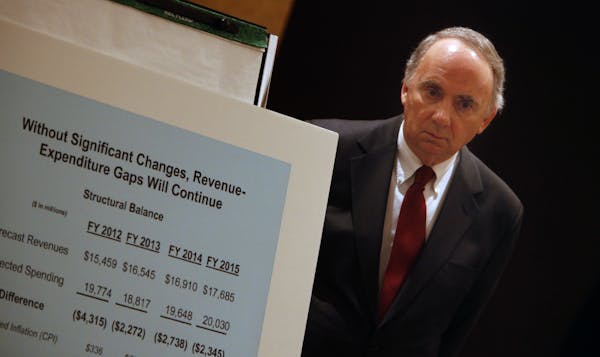SCHOOL FUNDING
The payment shift: A clearer understanding
The March 1 editorial ("State can start repaying schools") noted that the Legislature will begin using the $320 million in surplus to begin repaying the shift in payments to school districts. The law requires these payments when the state has refilled other budget reserves.
But schools will benefit much more from an increase in state aid using the same dollars instead of paying off some of the shift. Schools gain little from repayment of the shift, because those are dollars they would receive at a later date anyway and that have been recognized as revenue already.
They could get nearly $400 per pupil unit if the same $320 million in state funds were used to provide actual revenue increases instead.
We should not miss this opportunity, as we rebound from an economic crisis, to provide our schools and students with a real funding increase. The repayment of the shift can happen sometime in the future, when the state can afford to increase funding and repay that obligation.
Schools have received either zero or very small increases in state aid since 2006. The 2012 surplus could be used to avoid laying off teachers and cutting programs that are important to students. Virtually every district in the metro area is reducing staff or programs because the aid payments are inadequate.
The payment shift has been very misunderstood. It is a prudent action that has enabled the Legislature to avoid cutting school funding. The shift did not take money from schools, and the repayment does not give funding back.
It is a cash-flow issue and a timing-of-revenue-recognition issue that uses accounting differences between school districts and the state. We would never want the state to write off the cost of the shift, because that would constitute a real loss of revenue and would be catastrophic to districts, so the shift should be repaid some day.
Minnesota is one of the few states to not reduce funding for schools during the recent economic crisis. Now, it would be prudent to wait for better economic times to make payments on the shift and instead give schools real support in 2012.
DENNIS L. PETERSON, SUPERINTENDENT; MINNETONKA PUBLIC SCHOOLS
* * *
CHILD CUSTODY
State has the chance to break ground
Although a March 9 letter writer, a family-law advocate, is no doubt a well-meaning professional in the field of custody dispute, she greatly misrepresents the intent of the legislative bills that call for a presumption of joint physical custody in divorce proceedings.
The intent of the bill is not to "force" anyone into a situation where they must parent. The purpose of the bill is to allow children the God-given right to have two parents fully involved in their lives.
Under the present adversarial system of "winner takes all," one parent is designated to be "the parent" and the other "the visitor." Thousands of dollars are needlessly spent determining which parent should be which, while in fact both parents usually have much to offer the child.
The old system, which made sense back in the 1970s, when fathers worked and many mothers stayed at home, is gone. The old system resulted in animosity, gloating, violence, passive-aggression, parental undermining and lawyerism. The new system opens the door to cooperative child-rearing.
Minnesota, as a progressive state, is ahead of the curve on this issue.
JOHN HURD, NORTH MANKATO, MINN.
* * *
Rentals
Note requirements of licensure
An article in the March 10 Business section ("A new lease on jobs, thanks to rentals") noted the explosion of new jobs in the rental services sector. Unmentioned, and of importance to the public, was the statutory requirement of maintaining an active real estate broker license while engaged in rental property management. (Other requirements are entailed, such as maintaining liability insurance coverage.)
The surge in the rental market unfortunately will attract a few bad apples not inclined to submit to the requirements of statute.
I would urge landlords and tenants alike to ensure that their prospective property manager has indeed met the requirements. A good place to start is the Commerce Department's PULSE portal license lookup feature.
CHARLES KRUMRIE, MINNEAPOLIS
* * *
ROBERT BRUININKS
Actions are familiar to the private sector
Outgoing University of Minnesota President Robert Bruininks feather-nested himself and some favorites an extravagant sinecure. Feathergate will get legislative scrutiny because it squares with Republican ideas of government waste. But Bruininks merely adopted the entitlement sense prevailing in the private sector.
The executive class has for 30 years cut itself an increasing share of payroll from the working middle class. The entire consumer economy is threatening implosion. (Every parasite, every cancer, demonstrates a perverse urge to suicide by strangling its host -- greed mimics conscience!)
Bruininks will oversee a leadership center at the U. There, tomorrow's executives, scrubbed and manicured, will master the white arts of firm handshakes and taking meetings. They'll take their places atop America's business sector with no apparent acumen for their particular enterprises, but a tempered arrogance demanding outsized reward for their guesswork directing the firm's future.
MARK WARNER, MINNEAPOLIS
Cut down on electronic waste in Minnesota
In Minnesota, statistical gloom amid the hope of a progressive-led boom


